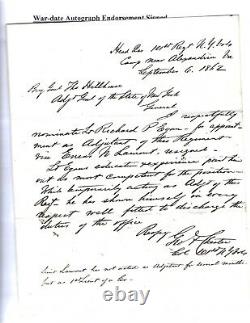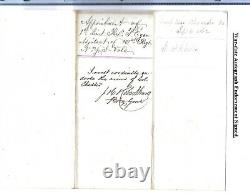
- Index
- Conflict
- Framing
- Material
- Theme
- Type
- Action Figure (26)
- Artillery (2)
- Biography (3)
- Bust (2)
- Cavalry (3)
- Civil War Book (2)
- Civil War Map (3)
- Code Key (4)
- Figure (2)
- Hardcover (2)
- History (2)
- Locomotive (2)
- Negative Film Photo (9)
- Painting (4)
- Photograph (226)
- Print (12)
- Santa (6)
- Sculpture (24)
- Sports Trading Card (2)
- Steam Locomotive (6)
- ... (2735)
- Unit Of Sale
Civil War Union Autographed Document General John Henry Hobart Ward III Corps




Condition as seen; Union Document written by Colonel George F Chester 101 NYVI requesting a promotion and signed and approved by General John Henry Hobart Ward of the III Corps. George Foote Chester was born January 28, 1828 in Lawrenceville, Gwinette Co.
Georgia, the only son of Elisha Walworth Chester, attorney at law, and Harriett. (Bliss) Chester, who were originally from Groton, New London Co.
From 1839 to 1868 his residence for the most part was in the city of New York. Where he fitted for college with Mr. Charles Wingate; was a part of a year a. Member of the New York University, and entered Yale May, 1843. Graduating, he spent a year reading law and other books. Year 1848 he taught a school in New London, Conn. York, and was admitted to the bar March, 1849. The winter of 1850 - 51, he spent in Minnesota; but, preferring the East as a. Happy to state that I stayed just long enough to break my arm, on the 14th, by the. At the outbreak of the war, he went out as private in the 71st. State Militia, for three months, sharing in the first battle of Bull Run. Afterwards he was Captain and Lieut.Colonel of the 101st Reg. He was present at the first battle Aug. At Bristow's, three days at the second Bull Run, or Groverton, three days at. The regiment, greatly reduced in numbers, disbanded soon after. John Henry Hobart Ward (June 17, 1823 - July 24, 1903), most commonly referred to as J.
Hobart Ward, was a career United States Army soldier who fought in the Mexican-American War and served in the New York state militia. He also served as a Union general during the American Civil War. During the Civil War he was wounded several times, and noted for both his performance in the 1863 Battle of Gettysburg and for his misconduct in the 1864 Battle of the Wilderness.
After the war Ward worked in New York's Superior Court, and was also remembered for his death when he was hit by a train. Ward was born in New York City to a family of military veterans. His grandfather John Ward had fought in the American Revolutionary War and had suffered a disabling wound, as had his father, James Ward, during the War of 1812. Hobart Ward was educated at Trinity College and enlisted at the age of 18 in the 7th U.
He was promoted several times over the next four years, reaching the rank of Sergeant Major. Ward saw considerable combat action during the Mexican-American War, fighting in the siege of Fort Brown and being wounded at the Battle of Monterrey.
He recovered in time to participate in the capture of Veracruz. Responding to President Abraham Lincoln's call to arms at the outbreak of the Civil War, Ward recruited the 38th New York Infantry and was appointed its first colonel. He led his regiment at the July 1861 First Battle of Bull Run, becoming acting commander of Brig. Willcox's brigade when the latter was wounded in battle.
He next saw action in the 1862 Peninsula Campaign in Brig. Birney's brigade of III Corps. Ward continued to perform well during the Northern Virginia Campaign, seeing more action at Second Bull Run and Chantilly. For his efforts, he was promoted to brigadier general of volunteers on October 4, 1862, and assigned command of what had been Birney's brigade in the III Corps of the Army of the Potomac.
Philip Kearny, who had been killed leading his division at Chantilly. Ward commanded the brigade at Fredericksburg and Chancellorsville. During the Gettysburg Campaign, Ward's brigade was assigned on July 2 by Maj. Daniel Sickles to hold a large area from the Wheatfield Road to Devil's Den. Stretched thin with little reserves, Ward's brigade nevertheless held their ground stubbornly.Regiments were moved to threatened points of the line, especially the left flank. Finally it was driven back by determined Confederate attacks. Ward became temporary commander of the division when Birney assumed corps command following the wounding of General Sickles. Hiram Berdan took command of Ward's brigade. Ward lost 781 officers and men out of 2,188 present, a loss of 35.7%.
[1] Ward suffered a wound on July 2 but did not relinquish command. Ward was again wounded later that summer in fights at Kelly's Ford and Wapping Heights.
During the Overland Campaign in the spring of 1864, he was assigned a brigade of Birney's 3rd Division, II Corps, one of the divisions in III Corps before the army reorganization of March 1864. Ward was wounded in the head at the Battle of Spotsylvania Court House. Removed from command on May 12 by Maj. Hancock for "misbehavior and intoxication in the presence of the enemy during the battle of the Wilderness, " Ward was arrested on June 12.Despite these charges, he was nevertheless honorably mustered out on July 18, 1864. After the war, he was a civil employee of New York City, serving as a clerk in the Superior Court from 1871 to 1896. At the age of eighty, Ward died in Monroe, New York, after being struck by a passing Erie Railroad train.
Following a funeral in Brooklyn, his body was brought back to Monroe and buried in the city's Community Cemetery. This item is in the category "Collectibles\Autographs\Military". The seller is "civil_war_photos" and is located in this country: US.
This item can be shipped worldwide.
- Modified Item: No
- Country/Region of Manufacture: United States
- Original/Reproduction: Original
- Autograph Authentication: Not Authenticated
- Signed: Yes
- Industry: Military

